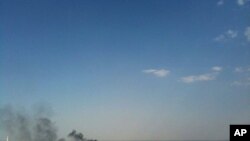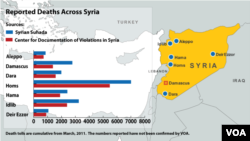Russia and China on Thursday vetoed a U.S.-backed U.N. Security Council resolution that would have imposed non-military sanctions on the Syrian government, putting the future of diplomacy in limbo as fighting continues in Syria.
After delaying the vote for a day to try to find common ground, the Security Council's decision comes a day after anti-government rebels bombed a meeting of top Syrian security officials, killing three senior military figures with close ties to President Bashar al-Assad, and as government shelling of neighborhoods in Damascus continued.
Thursday's vote was 11-2, with abstentions from Pakistan and South Africa. It was the third time during the Syria crisis that Russia and China have voted against the resolution.
4,950 main battle tanks
590 reconnaissance vehicles
2,450 armored infantry fighting vehicles
1,500 armored personnel carriers
3,440 artillery pieces
5,000 navy personnel
300 fighter-ground attack planes
48 intelligence/surveillance planes.
22 heavy transport planes
36 attack helicopters
100 reconnaissance/transport helicopters
The vote threatens the peace mission of U.N. special envoy Kofi Annan and leaves undecided the future of some 300 peacekeepers in Syria, whose mandate is scheduled to end Friday.
Britain’s U.N. ambassador Mark Lyall Grant said his country was appalled by Russia and China's decisions to veto the resolution. “The effect of their actions is to protect a brutal regime," he said, describing the resolution as being aimed at bringing an end to the bloodshed in Syria. "They have chosen to put their national interests ahead of the lives of millions of Syrians."
Speaking through a translator, Russia's U.N. Ambassador Vitaly Churkin said his country could not agree to a resolution that would have opened the path to external military involvement in Syrian domestic affairs, an opinion challenged by U.S. Ambassador Susan Rice.
"Despite paranoid if not disingenuous claims by some to the contrary, it would in no way authorize nor even pave the way for foreign military intervention," said Rice, adding that escalation of what she called the Syrian government’s attacks against its own people is all the more troubling when considering its stockpile of chemical weapons.
Kofi Annan, U.N. special envoy for Syria, expressed disappointed over the vote.
The Security Council is now considering a resolution that would extend that mandate for a brief period, allowing the observers to make an orderly withdrawal from Syria.
The Obama administration said Thursday it will work outside the U.N. process to help resolve the Syria crisis.
Fighting continues
With the faltering international diplomacy and continued fighting, analysts say the coming month of Ramadan could be decisive in the struggle for power between the Syrian regime and its opponents.
After delaying the vote for a day to try to find common ground, the Security Council's decision comes a day after anti-government rebels bombed a meeting of top Syrian security officials, killing three senior military figures with close ties to President Bashar al-Assad, and as government shelling of neighborhoods in Damascus continued.
Thursday's vote was 11-2, with abstentions from Pakistan and South Africa. It was the third time during the Syria crisis that Russia and China have voted against the resolution.
Syria's Armed Forces
Syria's Armed Forces- Ground Forces
4,950 main battle tanks
590 reconnaissance vehicles
2,450 armored infantry fighting vehicles
1,500 armored personnel carriers
3,440 artillery pieces
- Air and Naval Forces
5,000 navy personnel
300 fighter-ground attack planes
48 intelligence/surveillance planes.
22 heavy transport planes
36 attack helicopters
100 reconnaissance/transport helicopters
Britain’s U.N. ambassador Mark Lyall Grant said his country was appalled by Russia and China's decisions to veto the resolution. “The effect of their actions is to protect a brutal regime," he said, describing the resolution as being aimed at bringing an end to the bloodshed in Syria. "They have chosen to put their national interests ahead of the lives of millions of Syrians."
Speaking through a translator, Russia's U.N. Ambassador Vitaly Churkin said his country could not agree to a resolution that would have opened the path to external military involvement in Syrian domestic affairs, an opinion challenged by U.S. Ambassador Susan Rice.
"Despite paranoid if not disingenuous claims by some to the contrary, it would in no way authorize nor even pave the way for foreign military intervention," said Rice, adding that escalation of what she called the Syrian government’s attacks against its own people is all the more troubling when considering its stockpile of chemical weapons.
Kofi Annan, U.N. special envoy for Syria, expressed disappointed over the vote.
The Security Council is now considering a resolution that would extend that mandate for a brief period, allowing the observers to make an orderly withdrawal from Syria.
The Obama administration said Thursday it will work outside the U.N. process to help resolve the Syria crisis.
Fighting continues
Thursday was one of the deadliest days yet in the Syria conflict. A human rights monitoring group, the London-based Syrian Observatory for Human Rights, said more than 250 people were killed in fighting in several parts of the country.
Rebel forces claimed to have taken over border crossings with Turkey and Iraq, and to have attacked several government buildings in Damascus. Thousands of Syrians fled across the border into Lebanon.
With the faltering international diplomacy and continued fighting, analysts say the coming month of Ramadan could be decisive in the struggle for power between the Syrian regime and its opponents.
American University in Beirut political science professor Hillal Khashan said the events of the past few days have brought the 16-month-old crisis to a tipping point.
“I think Assad's days are numbered," he said. "There are strong indicators that he left Damascus [for] Latakia. And we also know that from the way the Syrian army is deployed in and around Damascus, and the heavy shelling of the city, indicates that Assad's forces regard the city as an enemy city. That is not how to treat your capital.”
Latakia is a coastal city where Assad's fellow Alawites have their stronghold. Khashan says if it is true that Assad has fled there, it would be similar to what Libyan leader Moammar Gadhafi did just before he was overthrown; he retrenched to his tribal area for protection.
Game changer
Lebanese American University political science professor Imad Salamey agreed, calling Wednesday's bomb attack a game changer.
“I think what happened yesterday is an earthquake," Salamey said. "It is a major blow to the regime's security apparatus. This will boost the morale of the opposition forces and will definitely make a turning point in events."
The Muslim holy month of Ramadan, during which the faithful fast from dawn till dusk, likely will begin Friday in much of the Arab world. Salamey said this month could be critical.
“I think the coming days, especially this month of holy Ramadan, will be decisive for Syria. I think we will be witnessing a dramatic situation, most probably the security apparatus in Syria will split and deteriorate fast,” he said.
In addition to Wednesday's attack on President Assad's top security chiefs, there was the defection earlier this month of a senior army general, Manaf Tlass.
Assad loyalty fading
Salamey said this indicates Assad is having difficulty maintaining the loyalty of the Sunni leadership within the military. He said he expects more defections, especially in the coming month.
“I think Syria after Assad will look more like Iraq after Saddam Hussein," he said. "In Iraq, the Kurds created their autonomous region and I think the Alawites will do the same.”
President Assad appeared on state television for the first time since Wednesday's bombing.
Analyst Torbjorn Soltvedt of the Maplecroft risk assessment firm in Britain said the bombing might have weakened domestic support for the Assad government.
“It's becoming evident that this will have a significant impact on the conflict. I think first and foremost, this will alarm core members of the regime and you may well see as a result increasing defections among key military and civilian officials as a result.”
No defections were reported Thursday.
Syria's population is just over 22 million people. The majority is Arab Sunni Muslim, but there are also significant numbers of minorities including Kurds, Armenians, Druze, Christians and the ruling Alawites.
Khashan said he thinks in a post-Assad Syria these groups might set up a federal state.
“I would not be surprised that after the demise of the regime in Syria we will have a federal order in Syria where each of the country's major ethic and religious groups will establish their own enclaves,” he said.
But analyst Salamey sees a different possible scenario. “I think post-Assad Syria will not be an easy transition," he said. "It will be a difficult one. Eventually I do not think it will be a very fragmenting situation as most have been projecting, simply because it is not possible to divide Syria along sectarian lines demographically.”
Larry Freund reported from U.N. headquarters in New York. Margaret Bresheer reported from Cairo. Al Pessin reported from Beirut.
Larry Freund reported from U.N. headquarters in New York. Margaret Bresheer reported from Cairo. Al Pessin reported from Beirut.












